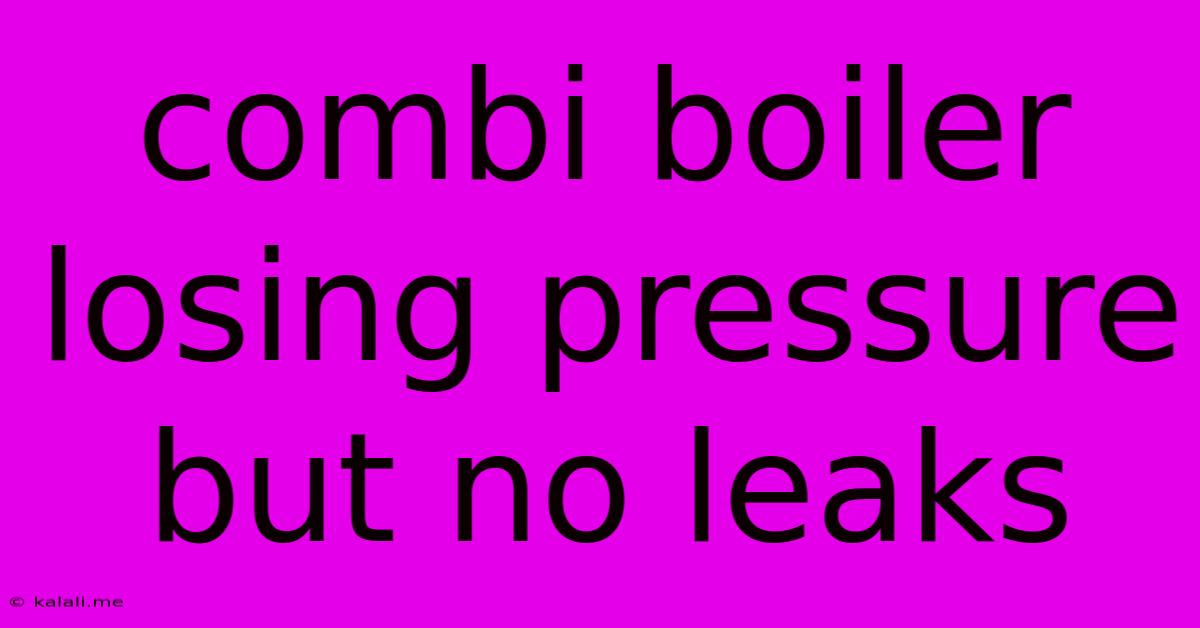Combi Boiler Losing Pressure But No Leaks
Kalali
May 21, 2025 · 3 min read

Table of Contents
Combi Boiler Losing Pressure But No Leaks: Troubleshooting Guide
Meta Description: Is your combi boiler losing pressure, but you can't find any visible leaks? This comprehensive guide explores common causes, troubleshooting steps, and preventative measures to get your heating and hot water back on track.
A combi boiler losing pressure without any visible leaks is a frustrating problem. It can leave you without hot water or heating, and identifying the source of the pressure drop can be challenging. This guide will walk you through the most common causes and provide practical troubleshooting steps to help you diagnose and fix the issue. Remember, if you're uncomfortable working with gas appliances, it's always best to call a qualified heating engineer.
Common Causes of Pressure Loss in a Combi Boiler Without Leaks
Several factors can contribute to pressure loss in your combi boiler without any obvious signs of leakage. These include:
-
Expansion Vessel Issues: The expansion vessel is a crucial component responsible for absorbing pressure fluctuations within the system. A faulty expansion vessel, often due to a failing bladder, can cause pressure to drop as it fails to compensate for temperature changes. This is a very common cause.
-
System Leaks (Hidden): While you might not see obvious leaks, tiny pinhole leaks in radiators, pipes, or the boiler itself can slowly bleed pressure over time. These are often difficult to detect visually but can be identified through pressure testing.
-
Pressure Relief Valve Activation: The pressure relief valve is a safety device designed to release excess pressure. If it's malfunctioning or if the system pressure consistently exceeds the safety limit, it might release water, leading to pressure loss. This often involves water dripping from the valve.
-
Component Failure: Other components like a faulty pressure sensor or a leaking diverter valve can also contribute to pressure loss. These require professional diagnosis and repair.
-
Air in the System: While not strictly a leak, air in the system can cause pressure fluctuations. This is usually noticeable as a gurgling sound from the radiators.
Troubleshooting Steps: Identifying the Culprit
Let's systematically troubleshoot your pressure problem:
-
Check the Pressure Gauge: Observe the pressure gauge regularly. Note the rate of pressure loss to better understand the severity of the problem. A slow leak is different from a rapid one.
-
Inspect Visible Pipes and Radiators: Carefully examine all visible pipes and radiators for any signs of dampness, corrosion, or leaks. Look closely, even in hard-to-reach areas.
-
Listen for Unusual Sounds: Pay attention to any unusual gurgling or hissing sounds emanating from the boiler or radiators. These could indicate air in the system or a small leak.
-
Examine the Pressure Relief Valve: Check the area around the pressure relief valve for signs of water leakage. If it's leaking, it may need to be replaced.
-
Check for Airlocks: If you hear gurgling noises, bleeding the radiators might release trapped air and restore pressure.
Preventative Measures to Maintain Boiler Pressure
Regular maintenance can prevent pressure loss issues:
-
Annual Boiler Service: A yearly service by a qualified Gas Safe registered engineer ensures your boiler operates efficiently and identifies potential problems before they escalate.
-
Regular Pressure Checks: Monitor the pressure gauge regularly and address any significant pressure drops promptly.
-
Bleeding Radiators: Bleeding radiators annually removes trapped air and maintains optimal system pressure.
When to Call a Professional
If you've tried the troubleshooting steps and still can't identify the source of the pressure loss, or if you're uncomfortable working with gas appliances, it's crucial to call a qualified heating engineer. They possess the expertise and tools to diagnose complex issues and carry out safe repairs. Ignoring a pressure problem could lead to further damage or even a dangerous situation. Remember safety first!
Latest Posts
Latest Posts
-
How Old Can Cats Be To Have Kittens
May 21, 2025
-
Why Does My Dog Bark At Dogs On Tv
May 21, 2025
-
Difference Between Ba And Bs Degree
May 21, 2025
-
How Do You Revive A Dying Acer Tree
May 21, 2025
-
How To Switch Off Home Alarm
May 21, 2025
Related Post
Thank you for visiting our website which covers about Combi Boiler Losing Pressure But No Leaks . We hope the information provided has been useful to you. Feel free to contact us if you have any questions or need further assistance. See you next time and don't miss to bookmark.